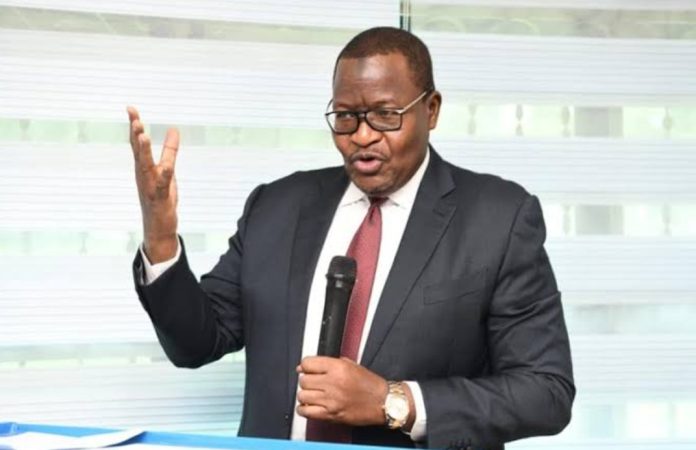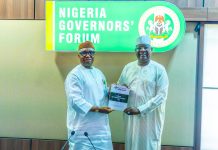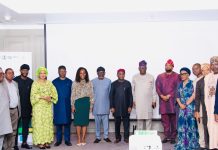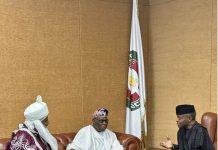by
Prof. Chidi Emmanuel Akujor, FAS
FRAS (UK), FNIP, FSESN, FRAES, FASN.
Introduction
This is a book that has a total of 531 pages including 27 preliminary pages. It is well organized in 8 sections with each section corresponding fairly with 8-point Agenda of the Strategic Vision Plan (SVP) of the EVC’s first tenure. The organization of the book in time sequence makes for excellent reading and clear understanding of the activities of Nigerian Communications Commission, NCC in the last 5 years.
The forward is beautifully presented by the late quintessential elder statesman, Ahmed Joda, CFR. It is unfortunate that he didn’t live to witness this great occasion. I shall proceed by looking at content of the book in 8 sections corresponding to the 8 SVPs.
The content
Section 1 exposes the meaning of broadband and broadband ecosystem and their benefits in enhancing socio-economic development (including GDP improvement), particularly in a developing economy like ours. It explains in diverse ways that the broadband referred to here is; available, affordable and sustainable broadband. The section compares Nigeria’s performance in broadband access and penetration with the rest of the world and sets the tone for what NCC had intended to achieve in subsequent years as not just a regulator but as a vehicle for “transporting” Nigeria’s digital economic growth.
The major challenges bedeviling the telecommunications industry, which have impact on the quality of service are identified and the efforts at addressing them are discussed. The reward for the successes recorded in this sector includes multiple international awards and recognition so far accorded Nigeria, which are listed in this section.
It also describes the structure and mandate of the Universal Service Provision Fund (USPF), including its enabling laws and sources of funds. The major milestones and current/future critical projects and connectivity programmes of USPF have been listed.
Section 2 deals with the technical and non-technical issues to be tackled in order to improve the Quality of Service (QoS) in Nigeria. It also identifies those factors that degrade the quality of service and explains the efforts of NCC to tackle the problems, including the existence of QoS task force in the commission. More so, it explains the collaboration of the commission with the relevant stakeholders and government agencies to improve the quality of service, particularly in telecommunication sector.
Section 3 deals with optimal use and benefits of (radio) frequency spectrum. This section also explains the decisions and measures taken by NCC under the watch of Prof. U.G Danbatta to ensure better and more efficient use of radio spectrum.
It identifies and deals with roles of “disruptive technologies” like mobile internet, cloud computing, “autonomous” and “non autonomous” vehicles in changing the world and the need to effectively prepare Nigeria for the emerging global competitiveness. In doing this effectively, NCC takes some measures like “creating a framework for spectrum trading and a roadmap for infrastructure sharing and by discouraging anti-competitive conducts in the telecommunication sector.
This section also identifies some of the landmark achievements of NCC so far. For example, NCC was able to achieve a remarkable broadband penetration of 33.70% (April 2019) compared with 8.50% (2015), surpassing a projection of 30%. Nigeria also achieved a teledensity of 91% corresponding to 173.6million lines (April 2019). The sector’s contribution to the GDP was about 14.30% (2020) compared with 8.50% (2015), which corresponds to a whopping contribution of N2.27trillion.
Section 4 exposes the imperative of using ICT to improve innovation and promote economic growth. It explains a lot of the NCC’s interventions in the education sector. These include capacity building efforts using USPF support programmes and the activities of Digital Bridge Institute (DBI). It also showcases the role of NCC in ensuring the deployment of ICT tools in the health, financial services, transport sectors etc. The aim is to ensure that ICT sector benefits from the deployment of broadband infrastructure for economic diversification and free us all from the stranglehold of crude oil. A major work of NCC explained in this section is the promotion of research and innovation through collaboration with academia and the promotion of “hood, town and industry” collaboration. This includes the award of generous grants to academia to pursue research relevant to the telecommunication industry.
In section 5, the book explains in detail the collaborative efforts of NCC and the various stakeholders. This section succinctly lists the partners to include the three tiers of government and government functionaries, the licensees, different sectoral regulators, law enforcement and security agencies, investors in the industry, academia, the media and other professional groups.
It describes the efforts of the Danbatta administration to initiate and manage inter-relationships with these relevant interests in order to sustain growth in the sector. These “strategic co-operation and partnership are also needed to prepare the nation for other emerging technologies in the ICT sector. The EVC explains the efforts of NCC to enhance “research and development” in our educational institutions and consequent linkage with industry. This is needed not only for capacity building, but to enhance research in the universities, polytechnics and other colleges. It will help to make the educational sector competitive in the global milieu. In addition, the EVC enjoins the other agencies to support our higher institutions with complementary framework to ease infrastructure deficit.
This section also describes the essence of synergy between NCC and the financial sector represented by the central Bank in order to achieve the nation’s quest for efficient and safe financial services. It also explains the role of NCC, in collaboration with others in enhancing the establishment of Nigeria Computer Emergency Response Team (ngCERT) coordination Centre. Indeed, it is an intellectual treatise on the shades of cybercrime and how to stay safe (protect your identity and data) particularly, in the post Covid era.
In section 6, Prof. Danbatta explains the centrality of the consumer to the work of NCC by the declaration: “Consumer is king”. The consumer is entitled to and desirous of a safe environment to live his or her life free from telecom and cyber harassment or e-fraud. NCC has been diligent in taking measures to stem ‘e-pollution’ which includes unsolicited messages, consumption of sub-standard devices, regulation of e-waste, prompt and efficient handling of consumer complains etc. This is even more relevant now that consumers are increasingly relying on telecommunication networks for financial transactions. NCC, therefore sees the need to ensure and assure the consumer of the safety of personal data through constant and continuous consumer engagement.
This section also explains the efforts of Professor Danbatta to tighten SIM registrations and curb such practices as call masking/refilling and SIM boxing, which are avenues for perpetuating e-fraud.
Section 7 deals with the role of fair competition in stimulating growth in the telecommunication industry and ICT. The benefits of instilling the spirit of fair, firm and forthright practices amongst the staff have also been cardinal to the work of EVC, these are practices that instill confidence in the cyber space, which in turn attract both local and national investors.
Here, we are given a new definition of poverty (information/ digital poverty) according to Subbiah Arunachalam as “lack of access to the internet in the developing world”. It explains that ICT on its own doesn’t imply development but is an enabler of development provided the environment is conductive and non-restrictive to youth, women and all vulnerable groups. When we improve ICT penetration and accessibility (including affordability, there will be stimulated growth in Agriculture, Trade, Finance, Transportation, Insurance, Educational delivery etc. Indeed, this is a necessary condition for growing the knowledge economy.
In the last section, Prof. Danbatta exposes the imperatives of ensuring regulatory and operational efficiency in achieving the “public good”. It is clear that “public good” means achieving socio-economic upliftment of the average citizen. This is actually the essence of the Nigerian Communication Act 2003 which followed the previous associated laws or decree. But it in noteworthy that this is encapsulated in the NCC mission: “to support a market driven communication industry and promote universal access” and its vision: “To be a responsive world class communication regulatory organization”.
The essence of the book
In my opinion, Professor U.G. Danbatta exposes himself as an unrepentant intellectual. On assumption of office he sets up a committee and articulates his vision and publishes it for all to see. At the end of his first tenure he has published a book that clearly says what his ambition was and does a self-assessment of his milage in that extra-ordinary leadership journey.
In this book he has given a lot of credit to his predecessors, his directors and other workers, members of the board and all others who in one way or the other have impacted on his leadership. In a country where leaders not only jettison the projects of predecessors but cancel previous projects, this is unprecedented.
The EVC has not forgotten his original constituency, the academia. Indeed, the word “academia” was mentioned 25 times and only trailing “National Broadband plan” mentioned 31 times. This connection with the word “academia” is obvious, because the availability of ubiquitous broadband to the academia is a game changer for vibrant and competitive teaching and research activities in our educational institutions, particularly if we are able to fund the last mile connections between our campuses and the national fiber optic cables which mainly run on the highways.
Also, the government of the day deserves some commendation for appointing Prof. Danbatta, a core professional as the EVC and renewing it for a second term. When a round peg enters a round hole the result is a fitting production orifice.
Finally, who is this book for? I am convinced that it is more than a collection of speeches and presentation. It contains so much data, graphs, sketches, plots etc. The list of useful abbreviations of phrases relevant to the industry is provided. Furthermore, the language is very simple while the organization and the printing are superb.
It will be a very handy document for all industry players, International partners and all telecom enthusiasts who need a lucid explanation of the interplay of forces between the telecommunications and ICT arena. For my colleagues in academia and fellow students (postgraduate and undergraduate), it is a practical handbook and guide to telecommunications and ICT in Nigeria and their relationship with global practices.
I sincerely recommend this book to all.
Thanks.








